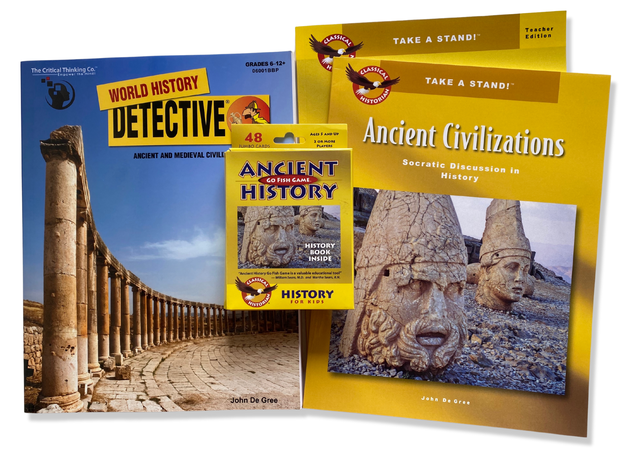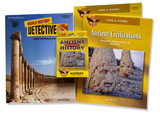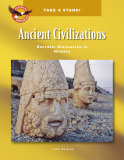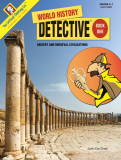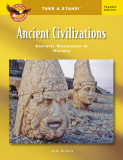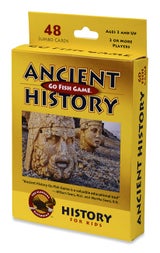- Store
- >
- Ancient History
- >
- Ancient Civilizations Bundle
Ancient Civilizations Bundle
SKU:
103
$91.96
$82.76
$82.76
On Sale
Unavailable
per item
This comes complete with everything the educator and student need to teach Ancient history and the tools of the historian. Teach an exciting and engaging year of history with critical thinking skills and the Socratic discussion. If this is your first year teaching with us, we recommend you start with our teaching training course, Teaching the Socratic Discussion in History DVD Seminar.
We also offer videos of students discussing the topics in the program in The Dolphin Society.
HOW DOES IT WORK? |
|
-
Bundle Description
-
History Detective
-
Take a Stand!
-
Supplemental
-
Individual Materials
<
>
1. Take a Stand! Student Book
2. Take a Stand! Teacher Book (includes 32 Week Guide)
3.Ancient History Go Fish Game
4. History Detective, Ancient and Medieval History
5. Primary Source Documents (FREE on this website)
Classical Historian History Bundles have everything the educator and home school parent needs to teach an engaging year of history and the tools of the historian. The Take a Stand! Teacher Edition has detailed lesson plans that explain what to do for each lesson and tips how to organize the year, including planning for class presentations. At the beginning of the year in the first few lessons, students learn history content and the tools of the historian sequentially. After acquiring the necessary skills, students then complete research in their text and from our online primary source documents. Students then form a historical judgement on an open-ended history question. With this research, students engage in a Socratic discussion. If desired, the teacher then instructs students how to write the persuasive history essay.
2. Take a Stand! Teacher Book (includes 32 Week Guide)
3.Ancient History Go Fish Game
4. History Detective, Ancient and Medieval History
5. Primary Source Documents (FREE on this website)
Classical Historian History Bundles have everything the educator and home school parent needs to teach an engaging year of history and the tools of the historian. The Take a Stand! Teacher Edition has detailed lesson plans that explain what to do for each lesson and tips how to organize the year, including planning for class presentations. At the beginning of the year in the first few lessons, students learn history content and the tools of the historian sequentially. After acquiring the necessary skills, students then complete research in their text and from our online primary source documents. Students then form a historical judgement on an open-ended history question. With this research, students engage in a Socratic discussion. If desired, the teacher then instructs students how to write the persuasive history essay.
World History Detective, written by John De Gree, covers both Ancient and Medieval History. But more than just cover the history content, it tells the history of Western Civilization, Asia, Africa, and Native American peoples of North and South America. Following in the "Detective Series" framework, The Critical Thinking Company published World History Detective with the goals of teaching critical thinking and reading, teaching how to analyze inference, and doing so in a tightly-structured narrative. The book has won numerous awards and remains a favorite among students and teachers.
Winner of the Tillywig Brainchild Award: "World History Detective eliminates the possibility of the passive student. Instead of simply providing facts for rote memorization, it requires students to assess what is put before them, to ferret out evidence and draw inferences and conclusions based on that evidence. And it systematically provides the necessary tools to do so. Through the structure and content of the book, the student gains formidable critical thinking and analytical skills, and an understanding of not just the material presented, but of a process of how to delve into any material and come away with the core knowledge. The focus of Book 1 is on ancient and medieval world civilizations, with content skills based on common state social studies standards for Grades 6 and 7. Each lesson is brief - a page or so followed by a series of questions and a concept map to be completed - keeping the reader fully engaged. Questions are multiple choice, short answer, and short essay. Sentences in the lessons are numbered, and students use these numbers to identify supporting evidence when answering questions, nipping in the bud any tendency towards guessing. World History Detective is effective as a standalone textbook, as an enhancement to another textbook, or as a review course for older students. In any event, the benefits the student gains from it will be lifelong."
Testimonials:
"World History Detective® accomplishes more than just teaching world history. It also can replace reading comprehension activities since that is a major function of the lessons. It might provide a significant amount of composition activity, especially if you use the opportunity to help students develop essay writing skills. Depending upon how often you use the lessons, students can complete World History Detective, Book 1 in one or more years. A one-year schedule would require at least two lessons per week, but using it alongside another program over a longer period of time should work fine too." -Cathy Duffy Review
"Surprisingly my 11-year-old REALLY got into this workbook. GASP! A workbook for history? Yes! Honestly, I was just as surprised! World History Detective® has 78 Civilizations to learn in self-guided chronological order. My son really like the condensed and concise information about civilizations filled with great maps, timelines, deductive question and concept maps." -Lisa Keva
"Importantly, the workbook portions are not simple read-and-regurgitate queries. Instead your student will be asked to point out which statements in a set of four are fact and which are opinion; or which of these phrases can be inferred from the lesson, and which sentences best support that theory. These types of questions help your child to grasp that history is always interpreted by those telling the story and to think through the varied reasons why an event happened as it did." -Timberdoodle
"I absolutely LOVE the critical thinking aspects of the curriculum. Implementing critical thinking into the reading and discussion of history is a powerful tool to help our children understand what they are reading as well as form an opinion and knowledge that they will be able to use in many situations in life." -Dina, California
For a Samples and More Information, Click Here
Winner of the Tillywig Brainchild Award: "World History Detective eliminates the possibility of the passive student. Instead of simply providing facts for rote memorization, it requires students to assess what is put before them, to ferret out evidence and draw inferences and conclusions based on that evidence. And it systematically provides the necessary tools to do so. Through the structure and content of the book, the student gains formidable critical thinking and analytical skills, and an understanding of not just the material presented, but of a process of how to delve into any material and come away with the core knowledge. The focus of Book 1 is on ancient and medieval world civilizations, with content skills based on common state social studies standards for Grades 6 and 7. Each lesson is brief - a page or so followed by a series of questions and a concept map to be completed - keeping the reader fully engaged. Questions are multiple choice, short answer, and short essay. Sentences in the lessons are numbered, and students use these numbers to identify supporting evidence when answering questions, nipping in the bud any tendency towards guessing. World History Detective is effective as a standalone textbook, as an enhancement to another textbook, or as a review course for older students. In any event, the benefits the student gains from it will be lifelong."
Testimonials:
"World History Detective® accomplishes more than just teaching world history. It also can replace reading comprehension activities since that is a major function of the lessons. It might provide a significant amount of composition activity, especially if you use the opportunity to help students develop essay writing skills. Depending upon how often you use the lessons, students can complete World History Detective, Book 1 in one or more years. A one-year schedule would require at least two lessons per week, but using it alongside another program over a longer period of time should work fine too." -Cathy Duffy Review
"Surprisingly my 11-year-old REALLY got into this workbook. GASP! A workbook for history? Yes! Honestly, I was just as surprised! World History Detective® has 78 Civilizations to learn in self-guided chronological order. My son really like the condensed and concise information about civilizations filled with great maps, timelines, deductive question and concept maps." -Lisa Keva
"Importantly, the workbook portions are not simple read-and-regurgitate queries. Instead your student will be asked to point out which statements in a set of four are fact and which are opinion; or which of these phrases can be inferred from the lesson, and which sentences best support that theory. These types of questions help your child to grasp that history is always interpreted by those telling the story and to think through the varied reasons why an event happened as it did." -Timberdoodle
"I absolutely LOVE the critical thinking aspects of the curriculum. Implementing critical thinking into the reading and discussion of history is a powerful tool to help our children understand what they are reading as well as form an opinion and knowledge that they will be able to use in many situations in life." -Dina, California
For a Samples and More Information, Click Here
The Take a Stand! series teaches students how to be historians. They learn not only basic facts of history, but how to analyze the events of the past. This unique approach makes the student an active participation in the analysis of the past. This is the best of critical thinking, Socratic discussion, and analytical writing in history. The Take a Stand! series is not a set of textbooks, but rather thinking, reading, speaking, and writing guides. Take a Stand! shows the student how to be a historian. The Teacher Edition contains the Grammar, Logic, and Rhetoric assignments necessary to teaching a student the basic content of history and the thinking skills needed to be an independent thinker in history. Each chapter contains a list of important vocabulary words (Grammar). Interspersed through the history content are thinking skills and open-ended questions (Logic and Rhetoric). The teacher needs to only follow from page 1 and continue to the end. This series has been made with over 20 years of teaching and publishing experience and represents decades of work and practice.
The Teacher Edition guides the teacher in providing weekly lesson plans, complete with exact reading assignments, research, and homework. Following the teacher guide will guarantee the teacher completes all lessons for the year without adding any stress involved in planning lessons. The teacher guide shows the teacher how to use the text (World History Detective), how teach the thinking tools of Take a Stand!, and provides teaching suggestions and ideas in how to get the best out of your student(s).
History Content: Early Human Civilizations, Mesopotamia, Egypt, and Kush, Ancient Hebrews, Judaism, Ancient Greece, Greek Literature and Mythology, Ancient India, Hinduism and Buddhism, Ancient China, Confucianism, The Roman Republic, Christianity
Thinking Skills: Fact or Opinion? Judgment, Supporting Evidence, Primary or Secondary Analysis, Using Quotes, Taking Notes, Analyzing Primary Sources, Cause and Effect, Compare and Contrast
The Teacher Edition guides the teacher in providing weekly lesson plans, complete with exact reading assignments, research, and homework. Following the teacher guide will guarantee the teacher completes all lessons for the year without adding any stress involved in planning lessons. The teacher guide shows the teacher how to use the text (World History Detective), how teach the thinking tools of Take a Stand!, and provides teaching suggestions and ideas in how to get the best out of your student(s).
History Content: Early Human Civilizations, Mesopotamia, Egypt, and Kush, Ancient Hebrews, Judaism, Ancient Greece, Greek Literature and Mythology, Ancient India, Hinduism and Buddhism, Ancient China, Confucianism, The Roman Republic, Christianity
Thinking Skills: Fact or Opinion? Judgment, Supporting Evidence, Primary or Secondary Analysis, Using Quotes, Taking Notes, Analyzing Primary Sources, Cause and Effect, Compare and Contrast
Sample
| sample_ancient_student_take_a_stand.pdf | |
| File Size: | 401 kb |
| File Type: | |
| sample_ancient_teacher_take_a_stand_.pdf | |
| File Size: | 472 kb |
| File Type: | |
FAQs:
1. Does Mom/“Teacher” watch Teaching the Socratic Discussion in History Seminar first before everything else?
Yes. Teaching the Socratic Discussion in History Seminar is made for the home school parent or classroom teacher and not for the student. Once trained, it is best for the teacher to instruct the class live.
2. Will this work if the home school parent has one student or in a classroom setting of 30?
Yes. This curriculum has been used successfully in both situations. In a setting with one student, the parent can encourage the student to take two sides and to argue against himself. Of course, this is after the tools of the historian have been acquired and after much practice. In a classroom setting or small group setting, students can debate and discuss with each other and the teacher acting as facilitator, or tutor.
3. How does the history text and the primary source documents fit in with the Take a Stand! student book?
Are they integrated?
Yes. The Take a Stand! Teacher Edition contains detailed lesson plans that explain when, in each lesson, to read the history text, what to assign for homework, what to do in each lesson, and when to read the primary source documents. The entire curriculum is seamlessly integrated. This curriculum has gone through ten years of practice in various settings and works excellently.
4. About how much time should I allot for each lesson/day/week to allow students to start and follow through to finish the lesson or paper? I know each student is different, but a general timeframe could be very helpful for planning purposes.
In a home school setting, we recommend the lessons take place once a week for one hour and a half. In the first half hour, play the Classical Historian Go Fish game that aligns with the curriculum. Begin with the Go Fish version then switch to the “Collect the Cards” version of the game as this teaches historical facts, chronology, and inductive thinking skills. Then, plan under one hour for the lesson. In our online classes which are discussion only, we teach 30 50-minute lessons for the year. For teachers who will be assigning papers, our Teaching the Socratic Discussion DVD Seminar goes into great detail about timing around assigning the paper, grading the paper, and rewriting the paper. Suffice it to say, it is hard to answer this question about writing quickly! If you do plan on assigning essays and do not have experience doing so, then you need to watch the seminar and apply the knowledge that is given.
In a classroom setting, plan on interspersing the 30 lessons throughout the year. One teacher shared that she enjoyed teaching this curriculum once per week where she had a Socratic Discussion day. Another teacher shared she enjoyed teaching this in chunks, such as one week every six weeks or so.
5. Is the high school program similar, except that it goes deeper and delves into more controversial topics?
Yes. The reading is longer and more complicated and the Socratic discussion questions are more challenging to understand.
6. How much time should I plan on having my child do the homework?
If the student is not writing any essay, junior high students can usually complete the homework from 30 minutes to one hour per week, and high school students from two to five hours per week, depending on the ability to read. If essays are assigned it really depends on the length of the essay (one-paragraph, five-paragraph, or more), the age of the student, the familiarity of the student with the writing process, and the choice of the teacher and writer if essays will be rewritten.
7. I see the junior high program comes with Socratic Discussion DVDs specific to the curriculum. How do I use those?
Teachers may use those in a variety of ways. The discussions can be watched for further teacher training. They can be shown to students after they have had their Socratic discussion. Students can use these as an “answer key” for their own discussions. Students could watch these before they have their own discussion and take notes to help them prepare for their own discussions.
8. I don’t really know history. How can I teach this?
We’ve all had history teachers who know “everything” and they were poor teachers.
For teachers of the junior high curriculum, you can read the history along with your child and it would take about 10 – 30 minutes a week of reading. For high school, it would require from one to two hours per week of reading.
9. Do I need to complete every single thing that is recommended in the Teacher Edition?
No. In the end, the teacher has complete authority to make judgement calls based on the situation and what the teacher thinks is best. We recommend that all students read the entire history text and engage in as many Socratic discussions as possible. After this, we have planned the curriculum to include writing, as students will learn history better if they have to defend their positions, however, in this area teachers may use their judgement as to how much work they want to plan for their students.
Yes. Teaching the Socratic Discussion in History Seminar is made for the home school parent or classroom teacher and not for the student. Once trained, it is best for the teacher to instruct the class live.
2. Will this work if the home school parent has one student or in a classroom setting of 30?
Yes. This curriculum has been used successfully in both situations. In a setting with one student, the parent can encourage the student to take two sides and to argue against himself. Of course, this is after the tools of the historian have been acquired and after much practice. In a classroom setting or small group setting, students can debate and discuss with each other and the teacher acting as facilitator, or tutor.
3. How does the history text and the primary source documents fit in with the Take a Stand! student book?
Are they integrated?
Yes. The Take a Stand! Teacher Edition contains detailed lesson plans that explain when, in each lesson, to read the history text, what to assign for homework, what to do in each lesson, and when to read the primary source documents. The entire curriculum is seamlessly integrated. This curriculum has gone through ten years of practice in various settings and works excellently.
4. About how much time should I allot for each lesson/day/week to allow students to start and follow through to finish the lesson or paper? I know each student is different, but a general timeframe could be very helpful for planning purposes.
In a home school setting, we recommend the lessons take place once a week for one hour and a half. In the first half hour, play the Classical Historian Go Fish game that aligns with the curriculum. Begin with the Go Fish version then switch to the “Collect the Cards” version of the game as this teaches historical facts, chronology, and inductive thinking skills. Then, plan under one hour for the lesson. In our online classes which are discussion only, we teach 30 50-minute lessons for the year. For teachers who will be assigning papers, our Teaching the Socratic Discussion DVD Seminar goes into great detail about timing around assigning the paper, grading the paper, and rewriting the paper. Suffice it to say, it is hard to answer this question about writing quickly! If you do plan on assigning essays and do not have experience doing so, then you need to watch the seminar and apply the knowledge that is given.
In a classroom setting, plan on interspersing the 30 lessons throughout the year. One teacher shared that she enjoyed teaching this curriculum once per week where she had a Socratic Discussion day. Another teacher shared she enjoyed teaching this in chunks, such as one week every six weeks or so.
5. Is the high school program similar, except that it goes deeper and delves into more controversial topics?
Yes. The reading is longer and more complicated and the Socratic discussion questions are more challenging to understand.
6. How much time should I plan on having my child do the homework?
If the student is not writing any essay, junior high students can usually complete the homework from 30 minutes to one hour per week, and high school students from two to five hours per week, depending on the ability to read. If essays are assigned it really depends on the length of the essay (one-paragraph, five-paragraph, or more), the age of the student, the familiarity of the student with the writing process, and the choice of the teacher and writer if essays will be rewritten.
7. I see the junior high program comes with Socratic Discussion DVDs specific to the curriculum. How do I use those?
Teachers may use those in a variety of ways. The discussions can be watched for further teacher training. They can be shown to students after they have had their Socratic discussion. Students can use these as an “answer key” for their own discussions. Students could watch these before they have their own discussion and take notes to help them prepare for their own discussions.
8. I don’t really know history. How can I teach this?
We’ve all had history teachers who know “everything” and they were poor teachers.
For teachers of the junior high curriculum, you can read the history along with your child and it would take about 10 – 30 minutes a week of reading. For high school, it would require from one to two hours per week of reading.
9. Do I need to complete every single thing that is recommended in the Teacher Edition?
No. In the end, the teacher has complete authority to make judgement calls based on the situation and what the teacher thinks is best. We recommend that all students read the entire history text and engage in as many Socratic discussions as possible. After this, we have planned the curriculum to include writing, as students will learn history better if they have to defend their positions, however, in this area teachers may use their judgement as to how much work they want to plan for their students.
Have you watched the video and read everything but still have a question?
Email John De Gree and he will email you answers or set up a phone conversation with him.
Email John De Gree and he will email you answers or set up a phone conversation with him.

